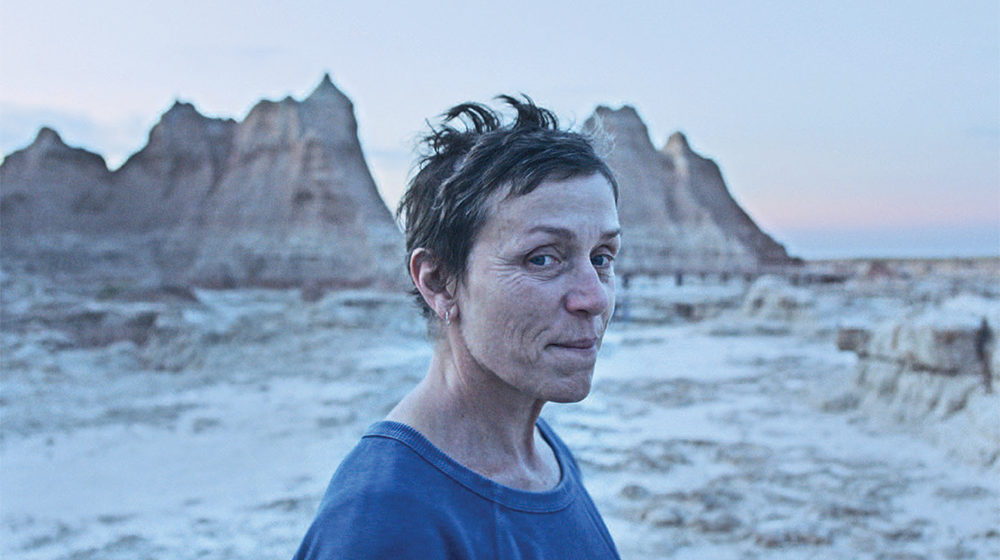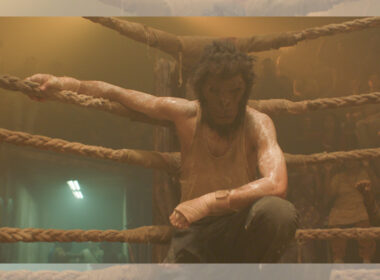Rating: ****
Nomadland feels like a steppingstone in modern American cinema. Its director, Chloé Zhao, finally makes it to the studio system after a couple of well-received but rarely-seen indie darlings. The gamble paid off for Zhao who just finished shooting Eternals, an upcoming big Marvel Cinematic Universe behemoth supposed to be released this coming November. Talk about persevering in the American dream for long enough. That’s not to say Zhao had to give something in to get this little film financed by Fox Searchlight (a subsidiary of Disney) and starring two award-winning actors.
Nomadland was made with the same sweat and grit we saw in her two previous films, even more so. The actors, except for Frances McDormand and David Strathairn, are all real-life nomads playing themselves. It has a raw aesthetic that sits between fiction and documentary and deals with those hard subjects corporate America isn’t very comfortable with, even if it doesn’t go far enough in zeroing in the inhumanity of capitalism.
Inspired by Jessica Bruder’s non-fiction book Nomadland: Surviving American in the Twenty-First Century, a three-year examination of modern life nomads who travel around the country in vans taking odd seasonal jobs like packing Amazon deliveries in the Christmas in Nebraska, or beet picking in North Dakota, Zhao’s film follows Fern (McDormand), forced into this lifestyle after her husband’s death and the closure of their hometown’s mine. Houseless, not homeless – a difference Fern is happy to point out – she parks her van wherever she can: usually a desert near whatever job she can get and based on advice from other nomads.
The structure is very fragmented. We don’t stay long enough in a place to develop roots, which is the point of the lifestyle anyway. But the characters Fern encounters, real people telling their own stories, have such strong refreshing personalities so unusual in film, it’s hard not to feel a sad drip of nostalgia when it’s time to say goodbye. And Zhao knows this. Her eye to find the emotional core of us humans is only comparable to, dare I say, De Sica and Mallick. From these people she takes a genuine look at a forgotten America, more truthful and genuine than the work of other contemporaries like Debra Granik and Sean Baker. Right in the middle of the film, she lingers on a long closeup of an aging traveller contemplating her imminent death with what she has left to do. Her life was good, she says, because she once saw a family of moose in the wild. It’s both heartbreaking and life-affirming.
Even with all this observation, Zhao fails to develop the actual root of the problem – capitalism as an inherently cruel system. The film starts with a subtitle explaining how a mine in small town Empire, Nevada closed and less than a year later the postcode was discontinued. Yet it ends with a homage to those have died. How did it go from a social tragedy to a poetic take on our savage free spirit?
It’s not as if the film hides from it. Right at the start one of the nomads preaches about society chewing up and spitting out its “work horses”. Later Fern has an argument with real estate brokers who boast the market has never been better. They callously claim not everyone can just throw it all away and hit the road – as if it were Fern’s choice.
These more political messages hit right in the gut while having little emotional value. As the film progresses, Fern grows more and more content with her life. The ending falls into the trap of the poetic all-American romantic hero who roams the land aimlessly, thus encapsulating the eternal tradition of its pioneers.
Is this the right message the film wants to end on? Or is it because Zhao and McDormand fell in love with their subject so much they want her to find peace with herself? It has to be the latter.
For the most part, the film is careful not to be patronising or condescending: yet where it can it takes the chance to throw a couple of jabs at the American Dream. But as is tradition, the finale must dazzle us, leave us comforted or else we’ll be incomplete. To do so Zhao has to find a compromise that ends up betraying the real philosophy of its characters. This is not Zhao’s problem, it’s an American art problem – a country that has never come to terms with its own class struggle, and still believes in the enchantment of human perseverance.
There is a great double bill with Ken Loach’s latest film Sorry We Missed You. Both films take a caring look at the victims of capitalism, but where Zhao complements with beauty and poetry, Loach brings that revolutionary anger that can make a change.
Nomadland is now showing in cinemas.




